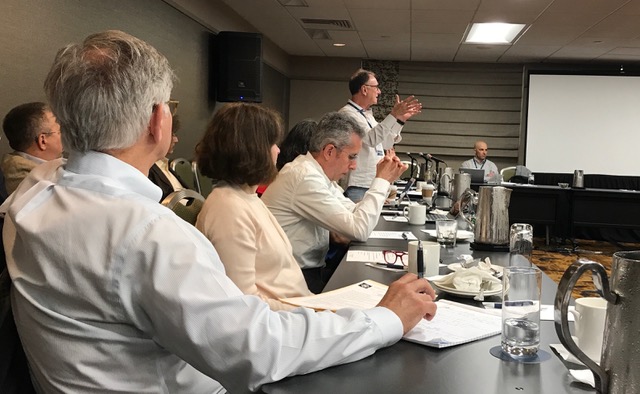
Alan Kraut, Executive Director of PCSAS, provided program representatives from 35 clinical science training programs with a summary of progress that is being made at the state level. PCSAS is clearly on a roll! New York recently became the latest state to allow PCSAS graduates to be licensed. This important effort was led by Joanne Davila and Dan Klein of Stony Brook University. Joanne heard the news directly from the Executive Director of the New York State Psychology Licensing Board: PCSAS graduates from New York schools are now eligible to sit for the New York exam. With this news, New York joins Illinois, Delaware, and New Mexico as states that have granted parity to PCSAS. Some other states, such as California, do not link eligibility for licensing to a particular form of accreditation. Therefore, parity is not an issue for graduates who seek licensing in those states.
Additional PCSAS programs are also considering starting or have already started state level licensing initiatives, particularly in states where there are two or more PCSAS programs (e.g., Arizona, Georgia, Missouri, Pennsylvania, etc.), though such an initiative does not need to wait for a second or third PCSAS program. If this is something of interest, please contact Alan Kraut at PCSAS. He is gathering a set of documents and strategies from programs now in the process. He would be happy to share this material and to consult and give as much support to these efforts as possible.

 PCSAS is an independent, non-profit body incorporated in December 2007 to provide rigorous, objective, and empirically based accreditation of Ph.D. programs in psychological clinical science (the terms psychological clinical science and scientific clinical psychology are used interchangeably).
PCSAS is an independent, non-profit body incorporated in December 2007 to provide rigorous, objective, and empirically based accreditation of Ph.D. programs in psychological clinical science (the terms psychological clinical science and scientific clinical psychology are used interchangeably).
 There are a multitude of reasons why APS is vital to you and to the science of psychology. From our advocacy efforts to our acclaimed scientific journals to our promotion of the education of psychology, APS is working hard to ensure the vitality and the advancement of psychology as a science.
There are a multitude of reasons why APS is vital to you and to the science of psychology. From our advocacy efforts to our acclaimed scientific journals to our promotion of the education of psychology, APS is working hard to ensure the vitality and the advancement of psychology as a science.
 The Delaware Project aims to redefine psychological clinical science training in ways that emphasize continuity across a spectrum of research activities concerned with (a) basic mechanisms of psychopathology and behavior change, (b) intervention generation and refinement, (c) intervention efficacy and effectiveness...
The Delaware Project aims to redefine psychological clinical science training in ways that emphasize continuity across a spectrum of research activities concerned with (a) basic mechanisms of psychopathology and behavior change, (b) intervention generation and refinement, (c) intervention efficacy and effectiveness...